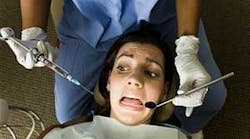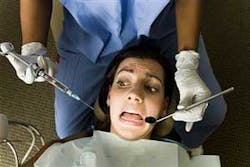Thursday Troubleshooter: I've suddenly hurt some of my hygiene patients. Help!
QUESTION: Twice in the last five months I’ve had patients complain that I hurt them during their cleaning appointment. Please help! I’ve been practicing dental hygiene for a long time and I don’t know what I’m doing differently all of a sudden. Any advice will be greatly appreciated!
ANSWER FROM DIANNE GLASSCOE WATTERSON: Professional Dental Management:
When patients complain to you or the doctor about pain with a routine preventive appointment, rest assured that both of you have a reason to be concerned. In the absence of periodontal problems, a routine preventive appointment should not be a painful experience. If one patient complains, there are probably 10 more who experienced the same discomfort but didn’t tell you.
The possibility of any patient leaving the practice over what he or she perceives as rough treatment is disturbing. Use this as a wake-up call. Are you rushing and being unnecessarily rough? Are you using dull instruments that cause you to exert too much pressure? Are you using improper instrumentation techniques that cause pain, such as “punching” the opposing interdental papilla with the sharp toe of a sickle? If your patient has inflammation, I advise you to use local anesthesia or one of the good topical anesthetics in the sulcus, such as Cetacaine®, that will keep your patients comfortable. To ignore a patient’s expression of pain is the worst thing you can do. Anytime a patient expresses pain outwardly, such as with a grunt or flinch, acknowledge that expression of pain immediately. “Oh, did that hurt? I’m sorry, I didn’t mean to hurt you.” When the patient is dismissed, use this verbiage — “You were a great patient today. I’m sorry that was uncomfortable for you. Next time I’ll try to do everything I can to make sure you stay comfortable.”
If your instruments are properly sharpened, you can use a lighter touch when engaging the blade. If you have trouble keeping sharp instruments, switch to American Eagle instruments, because they stay sharp far longer than anything else on the market.
ANSWER FROM RACHEL WALL, RDH, BS, Founder and President of Inspired Hygiene:
First, I think it's important to put these complaints into perspective. Assuming you’re working four 8-hour days per week, you've likely completed over 600 recare visits in the last five months. If two patients have complained, there are likely a handful more that feel the same way but haven't said anything. Still, if you had 10 patients feel this way that would still represent only 1% to 2% of the patients you've cared for during that time. Of course we hygienists want to have 100% patient satisfaction, so here are a few questions to ask yourself and some things to consider:
• Are you using worn out instruments? Dull scalers and worn out ultrasonic tips cause a hygienist to use more pressure and spend more time on a tooth. Be sure you’re using the manufacturers wear guides at least once a month to determine efficiency of ultrasonic tips.
• Are you feeling rushed and not properly adapting the cutting edge of the instrument properly?
• Ultrasonic tip selection and adaptation is critical to patient comfort. Using a heavy-duty ultrasonic tip on higher than medium power may be uncomfortable for some patients during a prophy or perio maintenance. A better choice would be a slim tip on medium to low power to remove moderate calculus and disrupt biofilm. Be sure you keep the tip adapted to the tooth and use care when scaling areas of recession and abfraction. I sometimes avoid these areas with the ultrasonic and use gentle handscaling to disrupt any biofilm present. A prophy cup can also be used to remove soft deposits in these areas.
• Could there be active gingival and periodontal inflammation that you are attempting to address with a prophy? Accessing bleeding pockets 4 mm or deeper usually requires scaling below the CEJ. If you're performing what some call a “difficult prophy” or spending more than 20 to 25 minutes on the scale and polish portion, then that patient may need something other than a prophy to resolve the infection.
I always check in with my patients throughout their appointment. Periodically I ask if they’re comfortable, and I really listen to their feedback. When a patient shares they are not comfortable, ask specifically which part of the experience they feel was painful (periodontal exam, scaling with ultrasonic vs. hand instruments?). This will help you determine where you can refine your technique or if the patient would benefit from a different (periodontal) procedure — topical anesthetic and/or desensitizing agents. Active listening and adjusting your approach will reassure your patients that you care and that you want to provide the highest level of care and comfort.
PAST THURSDAY TROUBLESHOOTERS:
Thong underwear can be seen through employee uniforms
The doctor won't let me tell my patients goodbye when I retire
I feel threatened by the second dental assistant
I have to clock out when patients don't show
Do YOU have a tough issue in your dental office that you would like addressed?
Send your questions for the experts to answer. Responses will come from various consultants associated with Speaking Consulting Network and Dental Consultant Connection. Their members will take turns fielding your questions on DentistryIQ, because they are very familiar with addressing the tough issues. Hey, it's their job.
Send your questions to [email protected]. All inquiries will be answered anonymously every Thursday here on DIQ.







